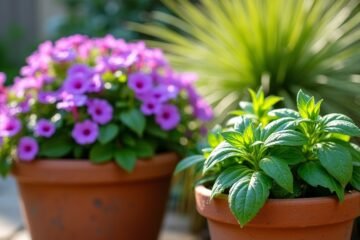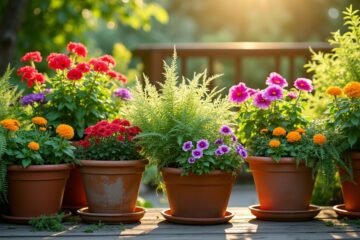Wanna boost your child’s growth? Gardening’s the way to go! Picture your little ones squatting, stretching, and lifting as they dig and plant. It’s a fun workout that sparks curiosity! As they marvel at sprouting seeds, they build social skills by teaming up with friends or family. Plus, with every wilting leaf they nurse back to life, they’ll learn responsibility. It’s a blooming adventure waiting for you, and there’s so much more to discover!
Enhancing Physical Health Through Gardening
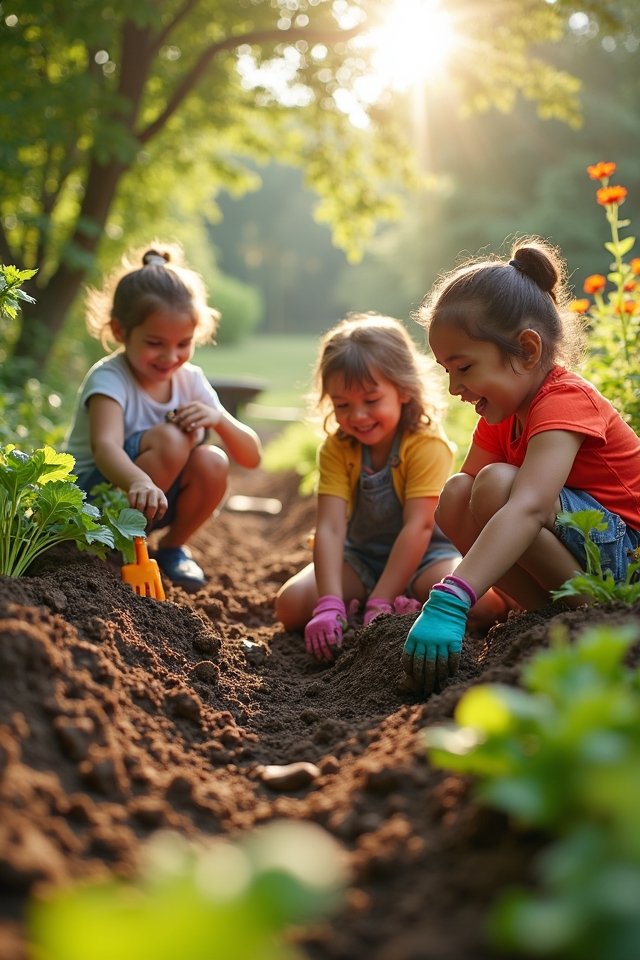
When you dig your hands into the rich, dark soil of a garden, you’re not just planting seeds; you’re also planting the roots of better health! Think about it: every weed you pull and every seed you sow is a fun workout in disguise! These garden exercises can boost your physical fitness while letting your creativity bloom. You’re squatting, stretching, and lifting—who knew gardening could be a secret gym? As you rake leaves or dig a hole, you’re building strength and stamina. Plus, fresh air and sunshine work wonders for your body! So, grab those tools and get moving! Your garden’s not just a patch of earth; it’s a playground for a healthier, happier you! Let’s grow strong together!
Fostering Emotional Well-Being
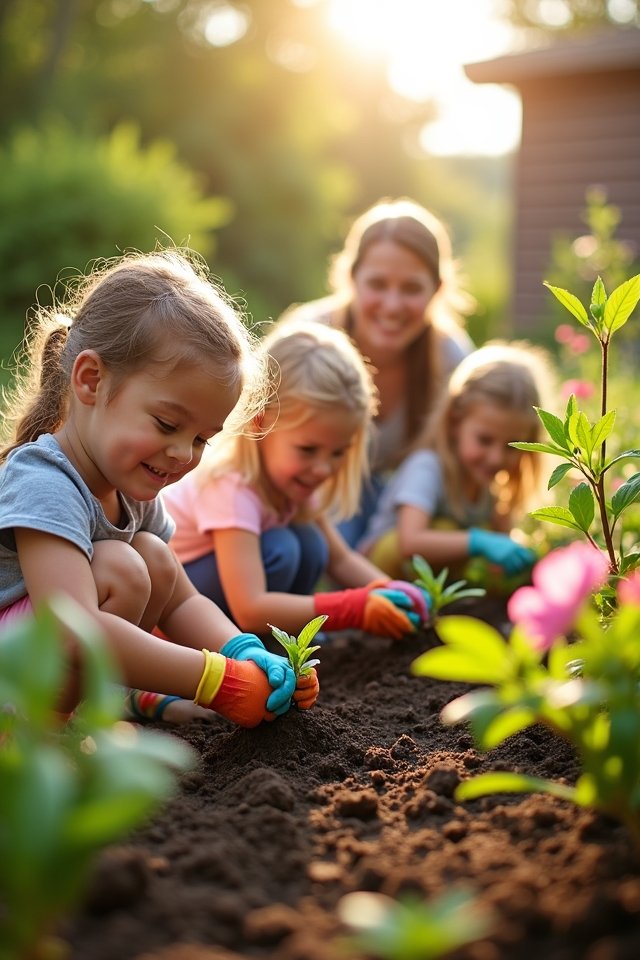
Gardening isn’t just about growing plants; it’s also a fantastic way to nurture your emotional well-being! Imagine this: a sunny day, fingers in the soil, and the sweet scent of blooming flowers. It’s pure bliss! Engaging in gardening activities lets you express emotions creatively—think of it as painting with nature! When you dig, plant, and water, you’re not just caring for your garden; you’re also relieving stress. Watching those tiny seeds sprout into vibrant life is incredibly rewarding! Plus, feeling the sun on your face while you tend to your plants can lighten your mood. So, get those hands dirty, release your creativity, and let the magic of gardening help you blossom emotionally! Who knew dirt could feel so good?
Promoting Social Skills and Teamwork
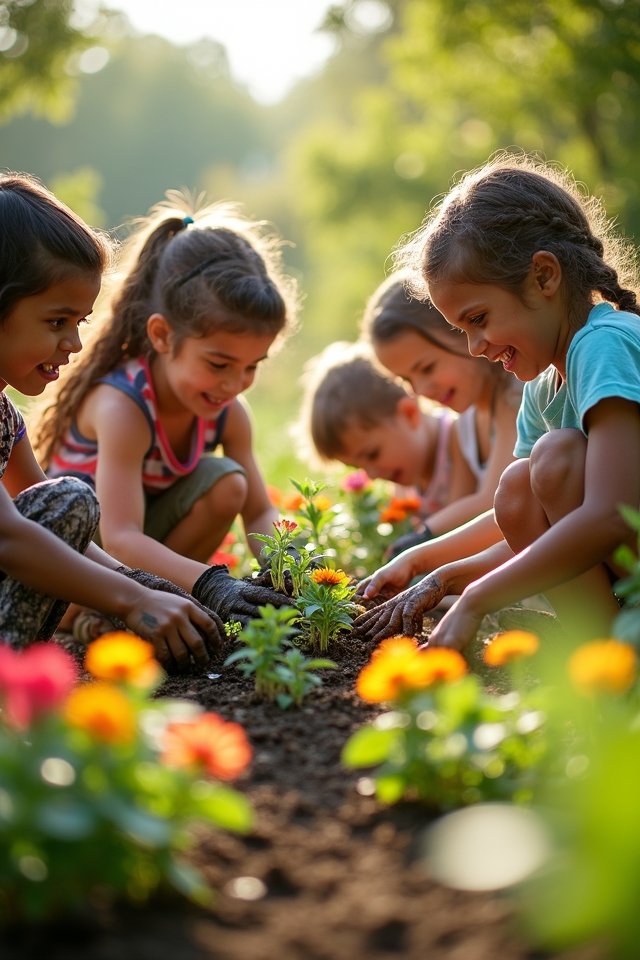
While you might think of gardening as a solo activity, it’s actually a fantastic way to boost social skills and teamwork! Envision this: kids collaborating on projects, digging together, and planting seeds side by side. They’re not just growing plants; they’re nurturing friendships! Communication exercises emerge naturally as they share ideas, negotiate roles, and cheer each other on. Imagine the thrill of a sunflower reaching for the sky, reflecting their joint efforts! These moments teach them the art of listening, sharing, and problem-solving. Plus, nothing beats the laughter that erupts when a muddy mishap happens! So, why not grab a spade and dig into this colorful adventure? Let’s cultivate not just gardens, but also blossoming social connections!
Encouraging Responsibility and Accountability
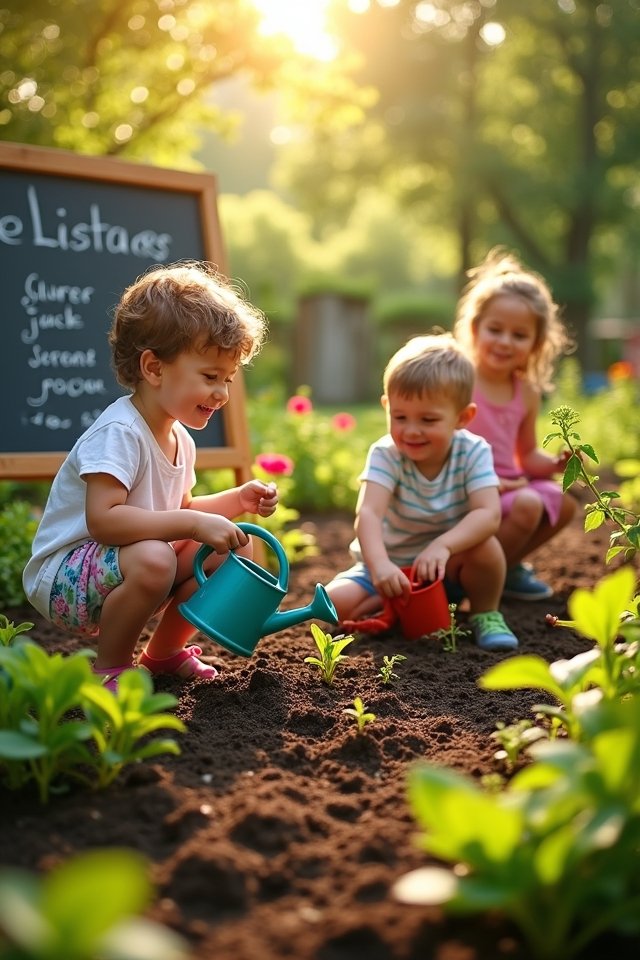
Taking care of a garden isn’t just about digging in the dirt; it’s a wonderful lesson in responsibility and accountability! When you assign your child specific tasks—like watering the plants or pulling weeds—they learn responsibility lessons firsthand. Each time they check in on their green friends, they’ll feel that little spark of pride!
Imagine the thrill of seeing a sprout emerge, knowing they nurtured it! Accountability practices become second nature as they track their plants’ needs, ensuring they don’t wilt away. Plus, who wouldn’t want to avoid a sad, droopy garden? By embracing these tasks, kids cultivate not just plants but essential life skills, all while having fun and getting a little dirt under their nails! What’s not to love?
Stimulating Cognitive Development
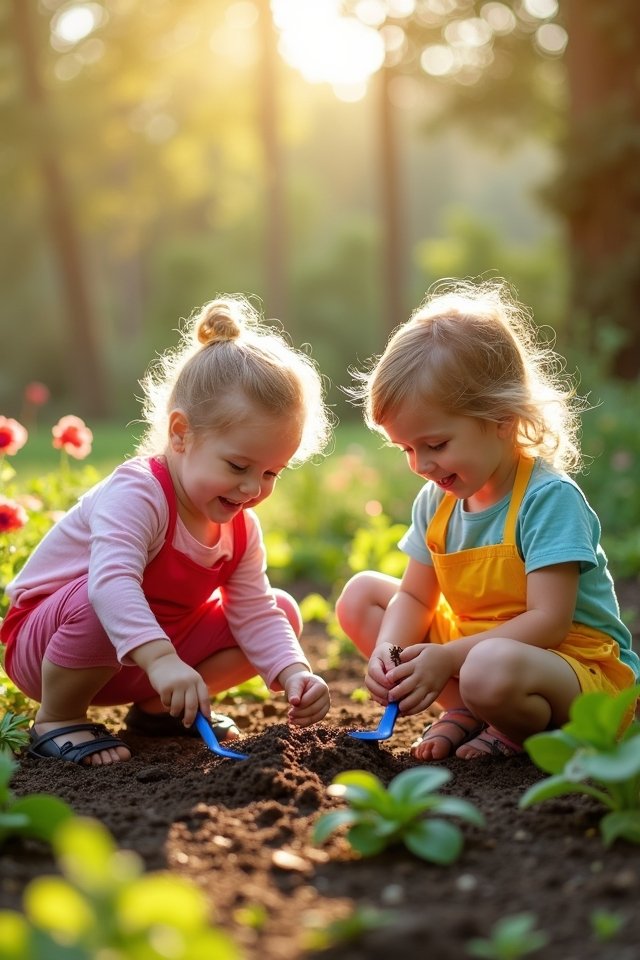
When you plunge into gardening with your child, a world of cognitive wonders unfolds! Each seed you plant sparks curiosity and creativity, enhancing their cognitive skills. Imagine them pondering why some plants need more sun than others—it’s like solving a delightful mystery! You can turn watering into a fun math game, measuring how much each plant needs. As they observe growth, they’re not just tending to plants; they’re unraveling nature’s puzzles, honing their problem-solving abilities. It’s like watching a tiny scientist in action! Plus, the thrill of finding a hidden worm or a sprouting seedling can ignite their imagination. So grab those trowels and dig deep into this enchanting adventure—your child’s mind is ready to bloom!
Cultivating Patience and Perseverance
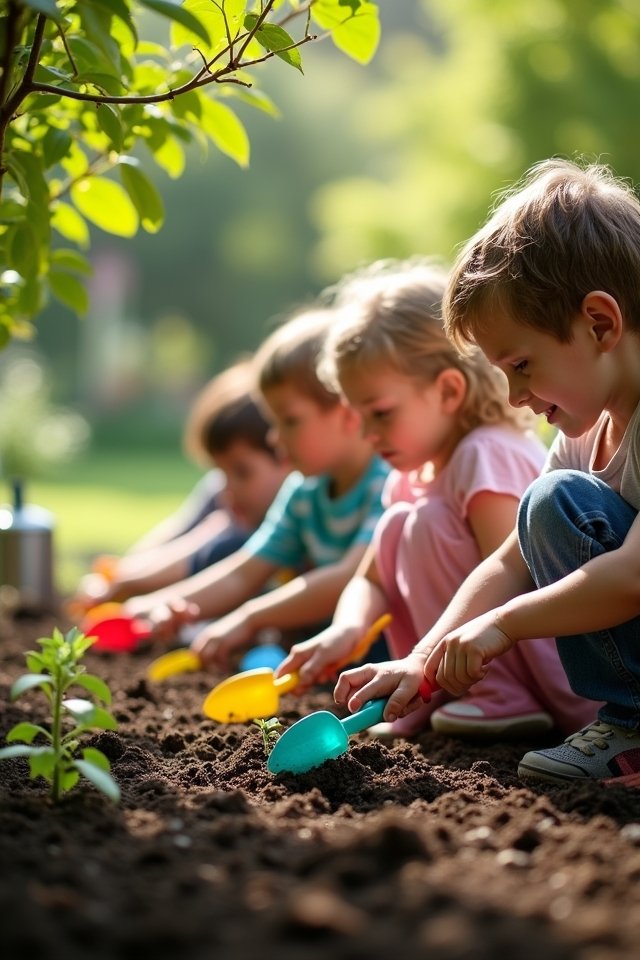
Gardening is like a magical lesson in patience and perseverance! When you dig into the soil, you’re not just planting seeds; you’re nurturing a growth mindset. You’ll discover that not every seed sprouts immediately, and that’s where the magic happens. As you practice mindful gardening, you learn to wait and watch, like a detective solving a mystery. Each day, you’ll check for tiny green shoots, and when they finally appear, it’s like finding treasure! You’ll face challenges, like pesky weeds or unpredictable weather, but overcoming these hurdles strengthens your resolve. Remember, even the tallest plants started as tiny seeds, just like your journey. So, roll up your sleeves, welcome the dirt, and enjoy the beautiful lesson of waiting!
Inspiring Creativity and Imagination
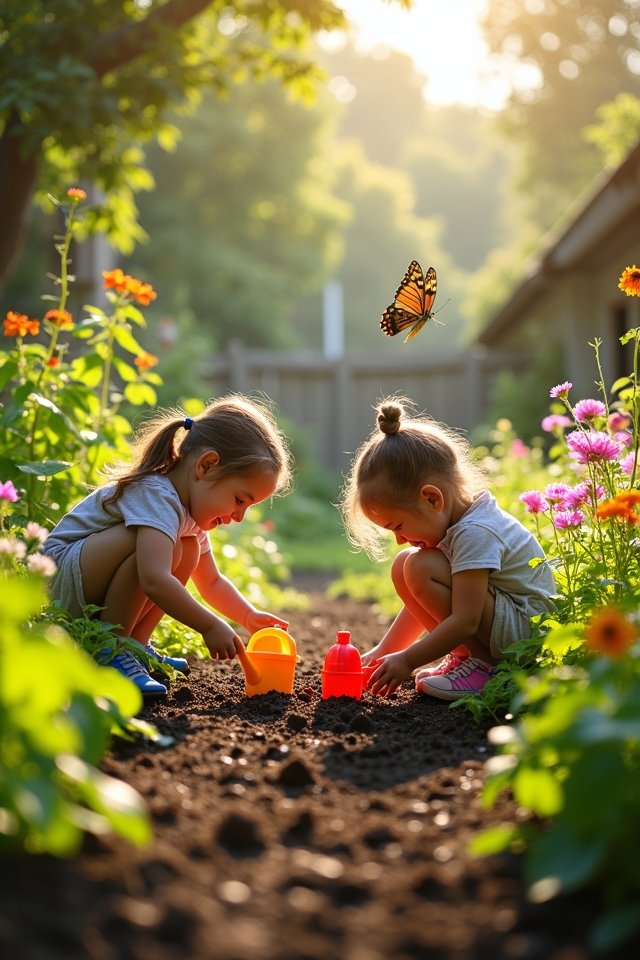
Every seed you plant isn’t just about waiting; it’s also about releasing your imagination! Envision this: a tiny seed transforms into a colorful garden, bursting with life and creativity. Through imaginative play, you can create stories around each plant. Maybe those sunflowers are giant sentinels guarding a fairy kingdom! Gardening encourages creative expression, letting kids design their own plots, mixing colors and shapes like a painter with a vibrant palette. Imagine building whimsical plant markers from recycled materials, turning each garden visit into an adventure. As they dig, water, and nurture, children learn that their ideas can flourish just like those blooms. So, let’s dig in and free that creativity—who knows what wonders await just underground!
Connecting With Nature and the Environment
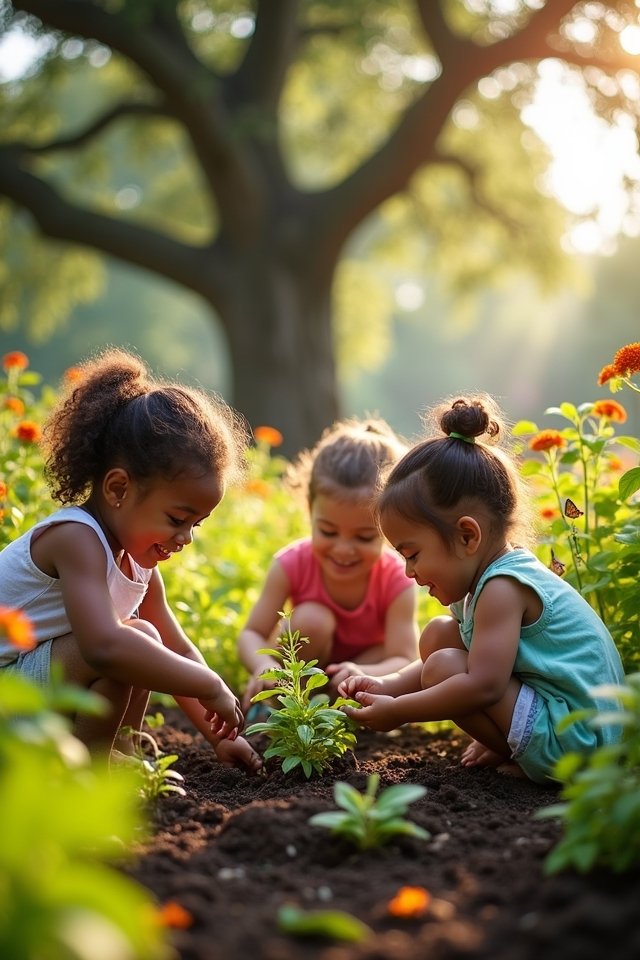
As the sun peeks over the horizon and the gentle breeze whispers through the leaves, you can’t help but feel a connection to the earth beneath your feet. Imagine digging your hands into the rich soil, discovering tiny critters that call it home. Nature exploration isn’t just an adventure; it’s a way to foster environmental awareness in kids! You’ll uncover the secrets of pollinators, marvel at vibrant flowers, and learn how ecosystems thrive. Why not make a game out of identifying local plants? With each garden visit, your children will grow curious, developing a sense of responsibility toward our planet. So, breathe in that fresh air, and let nature teach invaluable lessons, because every little discovery matters! Who knew dirt could be so delightful?
Learning About Nutrition and Healthy Eating
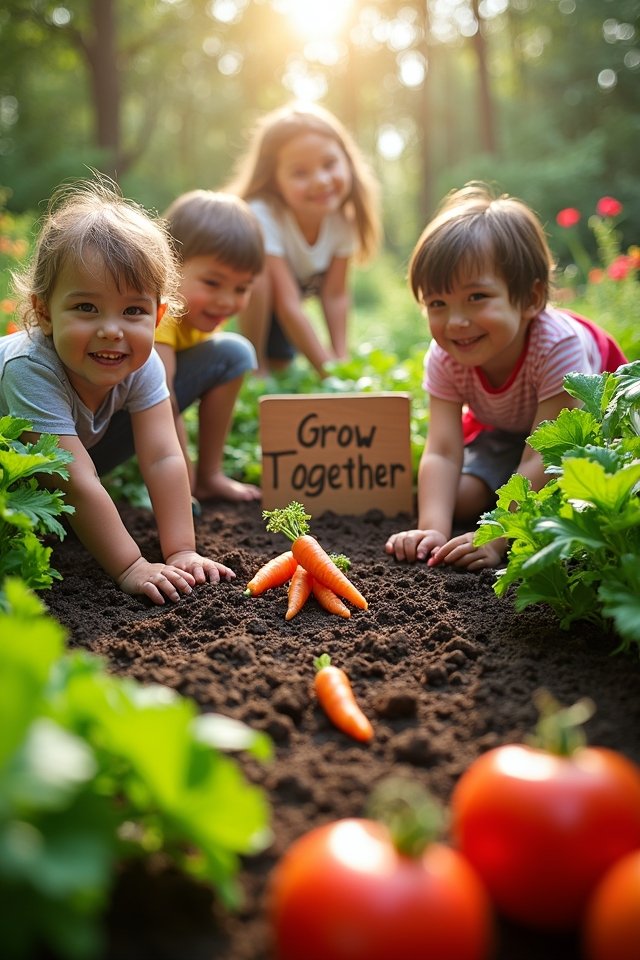
There’s something magical about watching a tiny seed sprout into a vibrant vegetable or fruit, isn’t there? As those greens grow, you’re not just cultivating plants—you’re diving into nutritional education! Imagine munching on freshly picked tomatoes, bursting with flavor, while knowing they’re packed with vitamins. Gardening helps you discover healthy choices firsthand. You learn that crunchy carrots aren’t just fun to pull—they’re also loaded with beta-carotene! Plus, how cool is it to whip up a salad using your own homegrown ingredients? It’s like being a chef in your own edible garden! So, let’s dig in, explore the soil, and welcome the delicious journey of healthy eating together! Who knew gardening could be such a tasty adventure?
Developing Fine Motor Skills
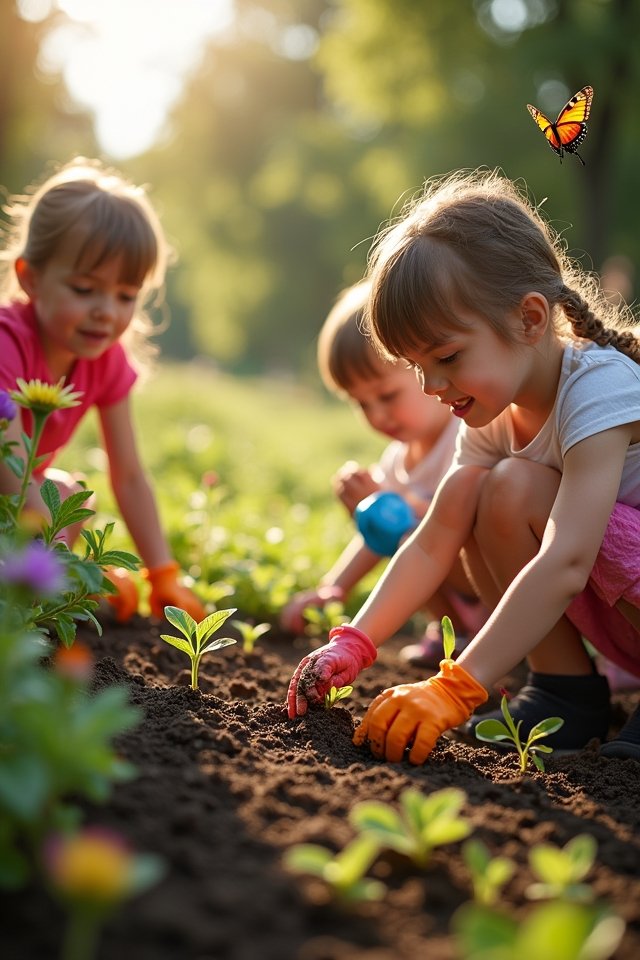
While you might think gardening is all about growing plants, it’s also a fantastic way to develop those fine motor skills! Envision this: your little ones digging in the dirt, their tiny hands working to plant seeds, developing hand-eye coordination with every scoop. Each time they grasp a watering can, they’re engaging in dexterity exercises that strengthen those precious fingers!
Imagine them carefully snipping herbs or pulling weeds, honing their ability to manipulate tools with precision. Gardening’s not just about nurturing plants; it’s an adventure in skill-building! So, grab those little gloves and release their creativity! Isn’t it amazing how a little dirt can lead to big growth? Let’s dig in and watch those skills blossom!
Strengthening Family Bonds Through Gardening Activities
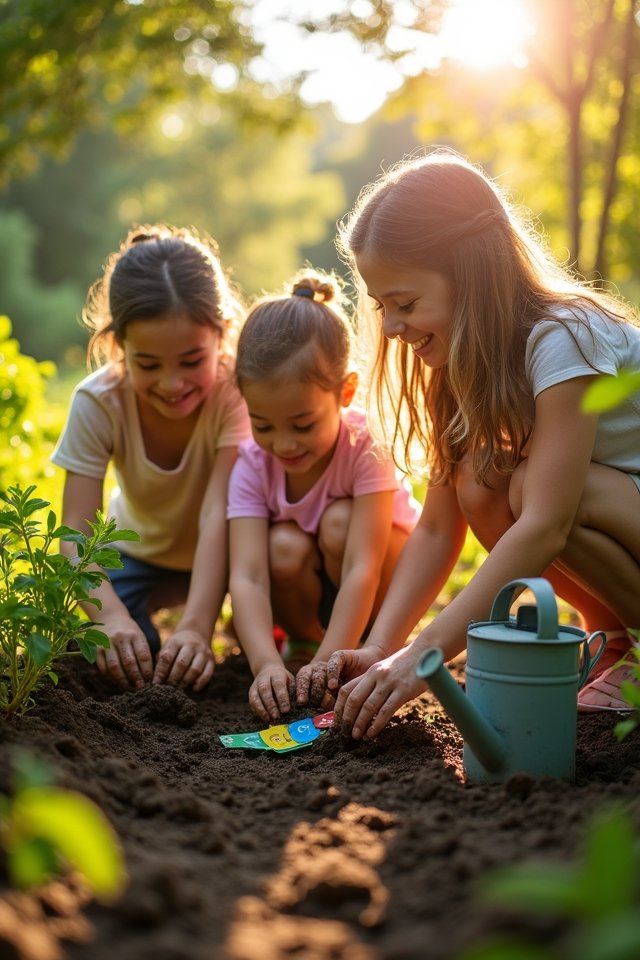
Gardening isn’t just a playground for little hands; it’s also a beautiful way to bring families closer together! Envision digging in the dirt, your hands smeared with soil, while laughter fills the air. Family gardening creates shared experiences that blossom memories, like those vibrant flowers in your backyard! Whether you’re planting seeds or harvesting veggies, you’re building teamwork and trust. Visualize this: your kids racing to see who can find the biggest tomato! These moments strengthen your bond, nurturing not just plants but relationships. Plus, you get to enjoy the delicious fruits of your labor together! So, grab those gardening tools, roll up your sleeves, and let the adventure begin—who knew growing together could be this much fun?
Frequently Asked Questions
What Age Is Best for Introducing Children to Gardening?
You’ll find that early exposure to gardening is the sweet spot for kids! Ages 3 to 5 are ideal for introducing them to the wonders of nature. Picture tiny hands planting seeds, giggling as they dig in the dirt! They learn responsibility and patience. By age 7 or 8, they can tackle more complex tasks, like planning a garden. It’s like nurturing a mini scientist—and who doesn’t love a little outdoor adventure? Let’s dig in!
How Can I Make Gardening Activities Safe for Children?
Imagine this: a mini garden warrior, wielding a trowel like a knight! To keep gardening safe for kids, use child-friendly gardening tools and always supervise. Set clear safety precautions—like wearing gloves and closed-toe shoes. Create a fun “no running” zone around sharp tools and plants. Encourage them to explore, but remind them that dirt can be their friend, not their foe! With a little creativity and care, gardening becomes a delightful adventure!
What Types of Plants Are Easiest for Kids to Grow?
When you’re choosing plants for kids, think fun and easy! Herb varieties like basil and mint are fantastic—imagine the delightful scents wafting through the air! They grow quickly, so kids won’t lose interest. Sunflowers are like cheerful giants, reaching for the sky, while radishes pop up in no time. With plant selection, keep it vibrant and simple. It’s like a mini adventure, where every sprout tells a story! Ready to dig in?
How Much Time Should Children Spend Gardening Each Week?
Imagine planting seeds of creativity in a garden; it takes time to see them bloom! Kids should spend about 2-3 hours a week gardening. This isn’t just about dirt and plants; it’s a fantastic lesson in time management and responsibility! As they dig, they’ll learn patience and reap the benefits of fresh air and sunshine. Plus, watching those seedlings sprout is like magic! Who wouldn’t want to be a gardener? 🌱✨
Can Gardening Be Adapted for Children With Special Needs?
Gardening can be a fantastic outlet for kids with special needs. Just imagine them digging their hands into cool, moist soil, feeling the textures of different plants! Inclusive gardening opens doors to sensory experiences—think vibrant colors and delightful scents. You can create raised beds or use containers for easier access. Plus, it’s a wonderful way to nurture teamwork and creativity! Why not give it a try? The garden awaits its little explorers!
